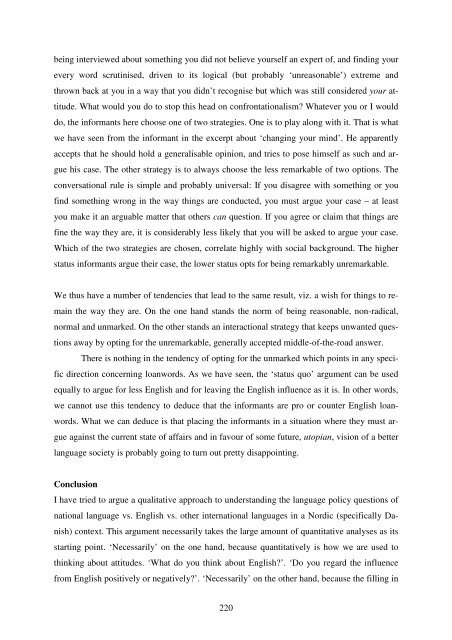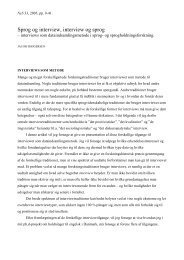Hør dog hvad de siger - Note-to-Self: Trials & Errors
Hør dog hvad de siger - Note-to-Self: Trials & Errors
Hør dog hvad de siger - Note-to-Self: Trials & Errors
You also want an ePaper? Increase the reach of your titles
YUMPU automatically turns print PDFs into web optimized ePapers that Google loves.
eing interviewed about something you did not believe yourself an expert of, and finding your<br />
every word scrutinised, driven <strong>to</strong> its logical (but probably ‘unreasonable’) extreme and<br />
thrown back at you in a way that you didn’t recognise but which was still consi<strong>de</strong>red your at-<br />
titu<strong>de</strong>. What would you do <strong>to</strong> s<strong>to</strong>p this head on confrontationalism? Whatever you or I would<br />
do, the informants here choose one of two strategies. One is <strong>to</strong> play along with it. That is what<br />
we have seen from the informant in the excerpt about ‘changing your mind’. He apparently<br />
accepts that he should hold a generalisable opinion, and tries <strong>to</strong> pose himself as such and ar-<br />
gue his case. The other strategy is <strong>to</strong> always choose the less remarkable of two options. The<br />
conversational rule is simple and probably universal: If you disagree with something or you<br />
find something wrong in the way things are conducted, you must argue your case – at least<br />
you make it an arguable matter that others can question. If you agree or claim that things are<br />
fine the way they are, it is consi<strong>de</strong>rably less likely that you will be asked <strong>to</strong> argue your case.<br />
Which of the two strategies are chosen, correlate highly with social background. The higher<br />
status informants argue their case, the lower status opts for being remarkably unremarkable.<br />
We thus have a number of ten<strong>de</strong>ncies that lead <strong>to</strong> the same result, viz. a wish for things <strong>to</strong> re-<br />
main the way they are. On the one hand stands the norm of being reasonable, non-radical,<br />
normal and unmarked. On the other stands an interactional strategy that keeps unwanted ques-<br />
tions away by opting for the unremarkable, generally accepted middle-of-the-road answer.<br />
There is nothing in the ten<strong>de</strong>ncy of opting for the unmarked which points in any speci-<br />
fic direction concerning loanwords. As we have seen, the ‘status quo’ argument can be used<br />
equally <strong>to</strong> argue for less English and for leaving the English influence as it is. In other words,<br />
we cannot use this ten<strong>de</strong>ncy <strong>to</strong> <strong>de</strong>duce that the informants are pro or counter English loan-<br />
words. What we can <strong>de</strong>duce is that placing the informants in a situation where they must ar-<br />
gue against the current state of affairs and in favour of some future, u<strong>to</strong>pian, vision of a better<br />
language society is probably going <strong>to</strong> turn out pretty disappointing.<br />
Conclusion<br />
I have tried <strong>to</strong> argue a qualitative approach <strong>to</strong> un<strong>de</strong>rstanding the language policy questions of<br />
national language vs. English vs. other international languages in a Nordic (specifically Da-<br />
nish) context. This argument necessarily takes the large amount of quantitative analyses as its<br />
starting point. ‘Necessarily’ on the one hand, because quantitatively is how we are used <strong>to</strong><br />
thinking about attitu<strong>de</strong>s. ‘What do you think about English?’. ‘Do you regard the influence<br />
from English positively or negatively?’. ‘Necessarily’ on the other hand, because the filling in<br />
220



